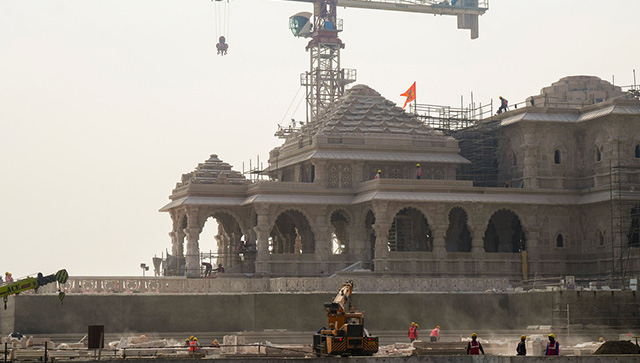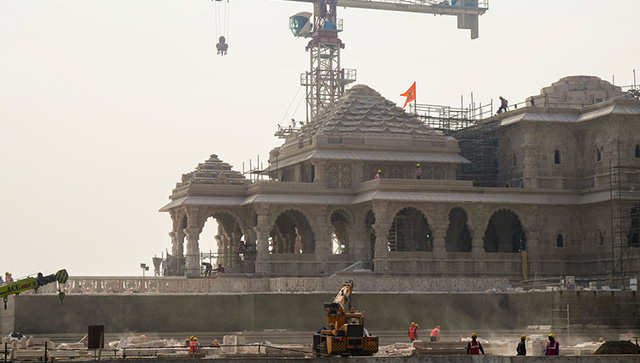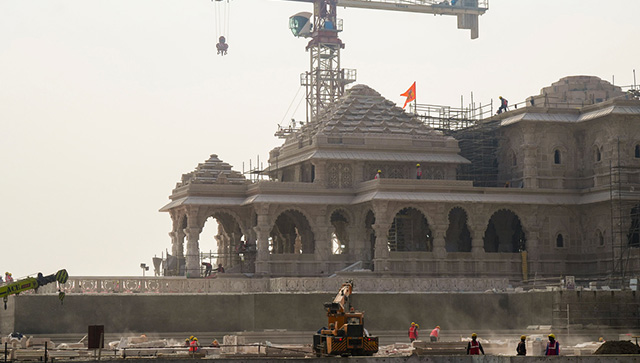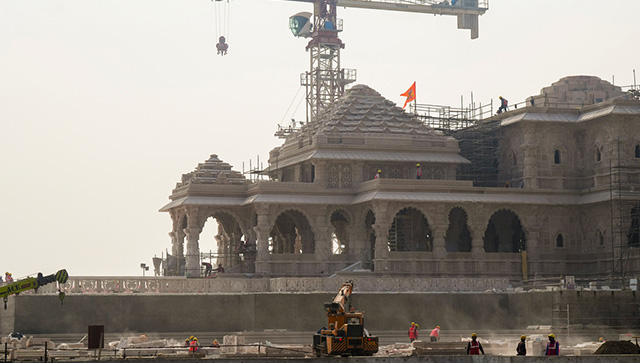Editor’s note: Within the span of 15 years, the Congress party in Assam has transformed itself from a fortress of invincibility to a heap of ruins. This four-part series will examine what ails the party in Assam and if there is a possibility of a spark that rekindles hope for the party to relive its glorious days. This is the second part of the series.
***
As much as the internal strife within the party can be blamed for the fall of Congress in Assam and many other states in India, a handful of external factors also led to its downfall. Failure to take along all constituents of its voter base despite having good relations with all of them proved to be detrimental as the BJP was quick to cash in on the gaps. Whether it was the Muslims, tea garden workers or the various Scheduled Tribes in Assam, the Congress no longer has a consolidated voter base to fall back upon.
Abandoned, Scheduled Tribes walk out of Congress hold
“Everyone knows why we lost our dominance in Assam after being in power for 15 years. One has to admit that various major groups of Congress supporters were alienated by the party from time to time because of the mistakes of Congress state leadership making BJP the biggest beneficiary. Take the example of the support enjoyed by Congress among the Bodo population. Congress had an alliance with the Bodo People’s Front but the alliance was abandoned suddenly without any backup plan. This only led to the mobilisation of most tribal outfits into an anti-Congress mode,” said senior Congress leader Kirip Chaliha.
Significantly, most of the Scheduled Tribes got their autonomous council status when the Congress was in power in the state. The Karbi Anglong Autonomous District Council came into being on 1 April, 1996 when the Congress was in power under then chief minister Hiteswar Saikia. The Dima Hasao Autonomous District Council, which was earlier known as North Cachar Hills Autonomous Council, came into existence on 2 February, 1970. Bimala Prasad Chaliha from the Congress was the chief minister then.
Both the Dima Hasao Autonomous District Council and Karbi Anglong Autonomous District Council enjoy their autonomy under the Sixth-Schedule of the Constitution.
The Bodoland Autonomous Council was created under the Bodoland Council Act of Assam, amended on 8 April, 1993 and it received the assent of the president on 3 May, 1993. It is also covered by the Sixth Schedule of the Indian Constitution with Saikia at the helm of affairs in Assam.
The Rabha Hasong Autonomous Council was formed under the Rabha Hasong Autonomous Council Act of 1995. In 1995, Saikia was the chief minister of Assam. It remains same for the Mising Autonomous Council, which was established under the Mising Autonomous Council Act, 1995 passed by Assam Legislative Assembly with its headquarters in Gogamukh. Similarly, the Lalung (Tiwa) Autonomous Council Act, 1995 was enacted by the state legislature and an interim Lalung (Tiwa) Autonomous Council was created.
The Deori Autonomous Council was established under the Deori Autonomous Council Act, 2005 and passed by Assam Legislative Assembly with its headquarters at Bhimbar Nagar. The Assam government passed the Thengal Kachari Autonomous Council on 12 August 2005 while the Sonowal Kachari Autonomous Council came into existence on 8 May, 2005 when Tarun Gogoi was the chief minister. The Rabha Hasong Autonomous Council, Mising Autonomous Council, Tiwa Autonomous Council, Deori Autonomous Council, Thengal Kachari Autonomous Council, Sonowal Kachari Autonomous Council are all Statutory Autonomous Councils constituted under State Act.
“Although the Muslim and tea garden community factor always got the limelight, there was a huge Scheduled Tribe voter base of the Congress which was silently voting for the party. They have always remained the deciding factor but mostly underrated. However, once Sarbananda Sonowal’s image got a boost as the chief minister of the state, his government conducted rounds of talks with all the ethnic organisations and created a deep understanding with them. They literally infiltrated into every ethnic organisation and made the most the leaderships of these organisations join the BJP,” said a party insider who chose to remain anonymous.
“All these autonomous councils had signed their accords when Congress was in power in the state. These leaders who were groomed by the Congress were all snatched away by the BJP. Sum Ronghang, the current Diphu MLA and present Assam hills area development minister was the earlier chief executive member of the Karbi Anglong Autonomous District Council and a Congress member. The present chief executive member of the Karbi Anglong Autonomous Council Tuliram Ronghang also a former Congressman and joined BJP with his followers. Ramakanta Deuri of Tiwa Autonomous Council with his Jatiya Oikya Mancha party is an ally of the BJP. No Tiwa was granted such an opportunity by the Congress. Tankeswar Rabha of the Rabha Hasong Autonomous Council was also offered a BJP ticket but he didn’t take it. However, he has got the full backing of the Sonowal government. Former chief executive member of the Missing Autonomous Council Ranoj Pegu won the Dhemaji Assembly seat on a BJP ticket. Pegu was also a long-time member of the Congress,” the insider said.
It is obvious that by capturing the leadership of these councils, the BJP is doing practical politics. “There is no longer something called ethics in politics and no party can take a moral high ground,” the insider said.
Dumped by ‘Ali and Coolie’
Until the point, the BJP made serious inroads into the tea garden community and to some extent into the Muslim vote bank of the Congress, the grand old party almost took it for granted that both the tea garden community and the Muslims won’t abandon them. Crudely coined by former Congress president Devakanta Barua, ‘Ali’ referred to Muslims, ‘coolie’ to tea garden labourers while ‘Bangali’ meant Bengalis and naak chepeta (flat nose) described the Nepalis in a derogatory manner.
“Earlier people used to make fun of the Congress as an ‘Ali-coolie’ party. Now the ‘coolie’ element is no longer with the Congress. Even some from the ‘Ali’ have shifted their allegiance to the BJP. After all, even they want safety and a pie of the benefits. The Muslims didn’t get anything from Badruddin Ajmal of the All India United Democratic Front, now they are thinking that won’t get anything from the Congress as well. They are not party workers after all,” said the insider.
At least undaunted in public, the party seems to play down the impact of losing its key voter base particularly the Muslims and the tea garden community.
“There is no relevance of ‘Ali’ or ‘coolie’ kind of euphemism in present-day politics. We are losing mostly due to our lack of understanding of the group behaviours and failures to stitch up viable equations well in advance. There were multiple reasons for our debacle in Assam, but the most dominant was religious consolidation among the Hindu voters precipitated by a carefully engineered perception that the Muslims would outnumber and swamp the Hindu population in Assam,” Lok Sabha MP from Nowgong, Pradyut Bordoloi told Firstpost.
The Nepali voters also opted for the BJP in the state as the Lok Sabha constituencies having a sizeable population of the community — Tezpur, Dibrugarh and Autonomous District — got painted in saffron in the last General Election. According to the 2011 Census, the Assam districts with the largest Nepali populations are Sonitpur — 135,525 (7.04 percent of the total population) — and Tinsukia — 99,812 (7.52 percent) — and Karbi Anglong — 51,496 (5.38 percent). While Sonitpur falls in Tezpur Lok Sabha constituency, Tinsukia is within Dibrugarh Lok Sabha constituency and Karbi Anglong falls within Autonomous District.
All the three Lok Sabha seats of Tezpur, Dibrugarh and Autonomous District were won by Pallab Lochan Das, Rameswar Teli and Horen Sing Bey respectively of the BJP.
“There has also been erosion with the Bengali voter base across India as they have shifted their allegiance to the BJP. Assam is no exception,” said Assam Pradesh Youth Congress, vice-president, Angkita Dutta.
Assam Pradesh Congress Committee general secretary Diganta Chaudhury claimed that it is not all Muslims and all tea garden workers have always voted for Congress.
“If you go by the history of the last three decades, minorities, especially Muslims, didn’t vote en-bloc for Congress and they had parties like UMF or AIUDF to represent their voice. In the tea garden areas, it was the Assam Chah Mazdoor Sangha affiliate of INTUC who persuaded the garden voters to vote in favour of Congress and it kept working till 2014 after which RSS/BJP’ affiliate Bharatiya Mazdoor Sangh made out space and squeezed our votes. About half of the voters we refer to as tea garden voters are actually ex-tea labourers who have migrated to other fields of work. This distinction is never made when we refer to the tea garden voters,” he said.
Politics of polarisation by BJP
Apart from accusing that the BJP has been playing politics of polarisation, Congress could hardly do anything more.
“BJP is playing the politics of polarisation in Assam. But instead of weeping in helplessness and cursing BJP for the polarisation, Congress will do well to find out how is it that BJP has succeeded in managing that? How is BJP winning the support of traditional Congress voters? Instead of simply denouncing the leaders who have left Congress as opportunists, the party should try to find out why thousands have abandoned Congress and Congress has become identified with only one community in the state?” asked Chaliha. The former Gauhati MP was referring to the Muslims when he said that “Congress has become identified with only one community”.
National Students’ Union of India national secretary Debashree Bora weighed in with ruthlessness while taking on the BJP and the Rashtriya Swayamsevak Sangh, or RSS.
“BJP and its parent body RSS has been propagating communalism since Independence. Whenever our party has been in power, we have done everything possible to curb such communal hatred propagated by the RSS because of which they have been banned a lot of times. Since we’re not in power, all we can do is educate and spread awareness among people about the rising hatred that the people of BJP has been spreading,” Bora said.
Levelling serious charges against the RSS, Chaudhury accused the organisation of following a divisive ideology that propagates bigotry and hatred towards other religions especially Islam". Linking it “with the advent and rise of Islamic terrorism since the 1980s”, he went on to say that “RSS was successful in propagating hatred against Muslims using different modes.”
RSS penetration into grassroots
The well-oiled machinery of the RSS, which has its existence much before BJP became a force to be reckoned with, has made the scenario even harder for Congress.
“We have been sluggish in countering the onslaught of the well organised RSS who have been successful in creating formidable alliances by roping in various assorted groups in their fold. We developed unnecessary fatty substance around our body when we were in power and failed to scientifically analyse the booth wise voting behaviour based on the past elections. The RSS is way ahead of us in the micromanagement of polling booths on the basis of demographic parameters,” Bordoloi accepted unambiguously.
Failure to reap benefits of protests against Citizenship (Amendment) bill
Just ahead of the Lok Sabha Election 2019, there were a series of vociferous protests against the contentious bill that sought to amend “ the Citizenship Act , 1955 to make illegal migrants who are Hindus, Sikhs, Buddhists, Jains, Parsis and Christians from Afghanistan, Bangladesh and Pakistan, eligible for citizenship.”
Many regional student and non-political groups besides the Asom Gana Parishad, which was an ally of the BJP, were steadfastly against the making of this piece of legislation and took the protest from the streets of Guwahati to the corridors of Parliament. The AGP even came out of the alliance to cash in on the rising Assamese nationalism and the Congress sniffing a tide against the BJP offered full support to prevent the bill from getting a nod in the Rajya Sabha. The bill could not be passed in the Upper House and ultimately met its natural death in June when the term of the Lok Sabha expired. However, Congress got carried away and failed to exploit the advantage it had on the ground even in the Upper Assam region where the protest was fierce.
“When there was an intense agitation going on against the BJP just ahead of the Lok Sabha election this year in the state, Congress became so overconfident of its victory that leaders started thinking about ministerial positions, even who will get chief ministership, although the state polls were a couple of years away. Consequently, the actual work to fortify the grassroots was almost neglected during that time,” said the insider.
To Bora, people are yet to understand the demerits of the Citizenship (Amendment) Bill.
“The major problem of the Citizenship Amendment bill is that people are yet to comprehend the disastrous consequences that could arise due to the Citizenship Amendment bill. Most importantly, the BJP is a master at diverting such issues from the minds of people. In the coming state election, the people of Assam will definitely prove to the BJP government that they are against the Citizenship Amendment bill,” she said.
The non-success of the Congress to convert the perception war on the Citizenship (Amendment) Bill in its favour cost heavily for the party in the last Lok Sabha election.
“Building up the perception is the leaders’ craft. We failed last time but we will definitely meet with success in the near future,” said Chaudhury.
Inability to take ownership of National Register of Citizens exercise
Although the decision to go ahead with the National Register of Citizens, or NRC, exercise was taken by the Congress government under then chief minister Tarun Gogoi, the party failed to claim ownership of this massive exercise to determine genuine citizens allowing the BJP to take political mileage out of it. Not only in Assam but the BJP also went on to utilise the NRC concept in West Bengal promising voters to conduct the exercise in the state in an apparent challenge to the Trinamool Congress state government under Chief Minister Mamata Banerjee.
“Though it was the Congress with Tarun Gogoi as chief minister had initiated the implementation of the NRC, they had to stop the process because of the pressure of the Muslim immigrant leaders. Now that the NRC has reached its final date of publication under the direct supervision of the Supreme Court, it is pathetic to see Gogoi and few others seeking credit for the NRC from the indigenous mass and opposing the NRC in immigrant areas,” Chaliha said.
Congress claimed that the NRC was a means to an end to resolve a long-standing issue of illegal immigrants but was caught unaware by the BJP move to claim credit for it.
“We are only against harassment of genuine citizens. Claiming credit for a project that should end decades of differences within communities was never our idea. Is it not true that NRC was launched during Congress rule or should we adopt the new history book shown by BJP? If they were so sincere in implementing NRC, then why did the Supreme Court had to intervene into it?” asked Chaudhury.
Calling the NRC a Congress project, Bora said, “BJP is well known for its marketing and advertising and hence it has managed to steal the credits for the same.”
The AIUDF factor
Call it arrogance or fear of handing over an opportunity on a platter to the BJP to call it a party favouring alleged “illegal migrants”, the Congress could never come to terms with the Badruddin Ajmal-led AIUDF.
“AIUDF emerged as a predominant anti-Congress Muslim group only because of a hostile Tarun Gogoi suddenly opting for soft Hindutva. The state Congress refused to entertain any understanding with the AIUDF even though the central leadership was in favour of some sort of meeting point. The disastrous effect is for all to see and it is tragic to see Gogoi is now advocating an alliance with AIUDF while another section opposes it vehemently,” Chaliha said.
It is unlikely that the Congress would go for a tie-up with the AIUDF, but as Chaudhury aptly put it, “Politics is dynamic, one can never rule out possibilities.”
As for the BJP, Chaliha pointed out, “The paradox is that the BJP decisively gained an advantage of the presence of AIUDF in the elections in the past and might now gain more if the Congress and AIUDF join hands in the future as they have portrayed Congress as a party of only the Muslims of Bangladeshi immigrants. On the ground, Bengali Hindus have rooted for the BJP, the Nepalis have moved away from Congress and so has the Hindi-speaking Bihari and Marwari population who had mostly been Congress supporters.”
Policies lost in implementation
The half-hearted attempts to implement policies which looked good on paper only earned the ire of the electorate when the Congress government was in power in the state.
“The Congress has also made mistakes like many other parties. In the framing of policies, Congress has not made many mistakes but there have been glaring faults while implementing them. People who made the policy were never bothered to implement them in the true spirit. It always looked great on paper. The party even failed to encash from the mistakes that the BJP made in their policies,” the insider said.
Failure to establish connect with the electorate is probably the worst nightmare for a political party and unfortunately, the Congress finds itself right in the middle of it in Assam.


)




)
)
)
)
)
)
)
)